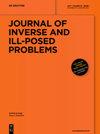Nonlinear system identification via sparse Bayesian regression based on collaborative neurodynamic optimization
IF 0.9
4区 数学
Q2 MATHEMATICS
引用次数: 0
Abstract
Sparse identification of nonlinear dynamics is a popular approach to system identification. In this approach system identification is reformulated as a sparse regression problem, and the use of a good sparse regression method is crucial. Sparse Bayesian learning based on collaborative neurodynamic optimization is a recent method that consistently produces high-quality solutions. In this article, we extensively assess how this method performs for ordinary differential equation identification. We find that it works very well compared with sparse regression algorithms currently used for this task in terms of the tradeoff between the approximation accuracy and the complexity of the identified system. We also propose a way to substantially reduce the computational complexity of this algorithm compared with its original implementation, thus making it even more practical.通过基于协作神经动力优化的稀疏贝叶斯回归进行非线性系统识别
非线性动力学的稀疏识别是一种流行的系统识别方法。在这种方法中,系统识别被重新表述为稀疏回归问题,而使用好的稀疏回归方法至关重要。基于协作神经动力学优化的稀疏贝叶斯学习是一种最新方法,它能持续产生高质量的解决方案。在本文中,我们广泛评估了这种方法在常微分方程识别中的表现。我们发现,与目前用于该任务的稀疏回归算法相比,该方法在近似精度和识别系统复杂度之间的权衡效果非常好。我们还提出了一种方法,可大幅降低该算法的计算复杂度,从而使其更加实用。
本文章由计算机程序翻译,如有差异,请以英文原文为准。
求助全文
约1分钟内获得全文
求助全文
来源期刊

Journal of Inverse and Ill-Posed Problems
MATHEMATICS, APPLIED-MATHEMATICS
CiteScore
2.60
自引率
9.10%
发文量
48
审稿时长
>12 weeks
期刊介绍:
This journal aims to present original articles on the theory, numerics and applications of inverse and ill-posed problems. These inverse and ill-posed problems arise in mathematical physics and mathematical analysis, geophysics, acoustics, electrodynamics, tomography, medicine, ecology, financial mathematics etc. Articles on the construction and justification of new numerical algorithms of inverse problem solutions are also published.
Issues of the Journal of Inverse and Ill-Posed Problems contain high quality papers which have an innovative approach and topical interest.
The following topics are covered:
Inverse problems
existence and uniqueness theorems
stability estimates
optimization and identification problems
numerical methods
Ill-posed problems
regularization theory
operator equations
integral geometry
Applications
inverse problems in geophysics, electrodynamics and acoustics
inverse problems in ecology
inverse and ill-posed problems in medicine
mathematical problems of tomography
 求助内容:
求助内容: 应助结果提醒方式:
应助结果提醒方式:


